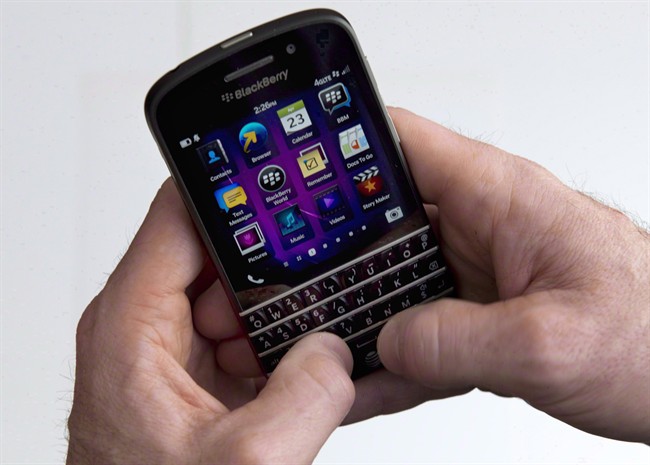TORONTO – Shares of Canadian smartphone-maker BlackBerry were trading higher Friday amidst rumours that the company’s CEO Thorsten Heins and the board of directors were weighing the idea of taking the company private.

Citing several anonymous sources, news agency Reuters reported that the company was considering the idea of going private, but noted that there was no imminent deal on the table.
BlackBerry declined to comment on the reports.
Experts, however, were not very warm to the idea.
Queen’s University business professor John-Kurt Pliniussen cautioned that taking the company private will not fix the immediate issues that BlackBerry is experiencing, including the slower-than-expected sales of their newest smartphones and operating system BlackBerry 10.
“The problem is its ability to come out with computing devices to compete in the market – it’s not working for them,” Pliniussen told Global News.
The Waterloo, Ont.-based company’s shares have recently been on a roller-coaster, rising to as high as C$18.39 in February to a recent low of $8.80 at the end of July.
Shares plunged more than 25 per cent in June after the smartphone maker’s Q1 results fell short of analyst expectations and shares fell below C$10 after it was announced the company gave layoff notices to 250 employees in its manufacturing, research and development areas.
Taking the company private would mean that BlackBerry’s publically traded stock would be delisted and would relieve the company of the requirement to publicly disclose its financial results.
This, Pliniussen said, would take a lot of weight off of the board of director’s shoulders as BlackBerry has been taking a beating in the media for years.
“The truth is there is no good news for BlackBerry, as long as you are a public company you have to report and the media is following you. They don’t want that,” said Pliniussen.
But, another downside to taking the company private would be the amount of time that a private acquisition takes to come together.
“The trouble that BlackBerry is facing is also trouble that needs to be fixed quite quickly if they are to survive as an independent mobile platform,” BlackBerry news site CrackBerry‘s Chris Umiastowski wrote in a blog post Friday.
“If BlackBerry 10 can’t turn them around, or if a cross platform BBM launch doesn’t bring them back to the top of the mobile IM game sometime soon then we’re probably talking about a huge change in business focus.”
Umiastowski uses the example of computer giant Dell’s private acquisition which has been ongoing for six months.
“By the time the company went private the opportunity to turn things around on the consumer front are potentially over,” wrote Umiastowski.
Why would BlackBerry go private?
“The first being they think it’s a deal – that they can milk the company and sell off its assets, or – two – they have access to information that we don’t know about.”
In order to go private, a person or group would have to put up an offer to acquire all shares in the company.
At the close of trading Thursday, BlackBerry had a total market value of about $5 billion – roughly what someone would have to spend to buy the company. If shares were trading at roughly $10 each that’s about 500 million shares outstanding, said Pliniussen.
“No private equity firm in the world would even consider paying five billion dollars for the company unless they are going to make money,” said Pliniussen.
But, even if an offer is put on the table the board of directors, along with the majority of shareholders, would need to accept the deal.
Pliniussen argued that shareholders would want to sell for two reasons – either they bought share when they were high and want to reduce their loss, or they bought when shares were low and are hoping to make what profit they can.
The board of directors, on the other hand, would want not only to approve a deal if it benefited them as shareholders, but it if benefited the company.
“They might approve an offer if they have faith that the expertise coming to them from the group that wants to acquire the company might come to them with some creative or innovative ideas that they might not have right now,” said Pliniussen.




Comments